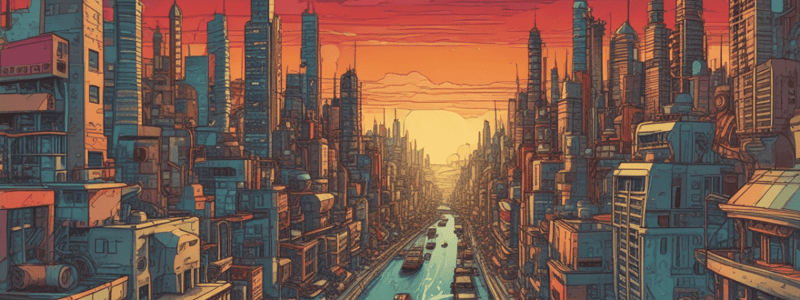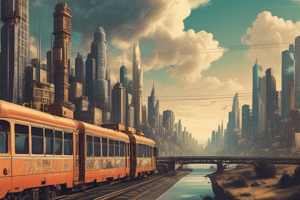Podcast
Questions and Answers
What primary belief do governments hold regarding development and environmental issues?
What primary belief do governments hold regarding development and environmental issues?
- Industrialization leads to environmental conservation.
- A robust middle class is not necessary for development.
- Environmental sustainability is prioritized over economic growth.
- Full development is dependent on industrialization and urbanization. (correct)
What percentage of global carbon dioxide emissions is attributed to the United States?
What percentage of global carbon dioxide emissions is attributed to the United States?
- 35%
- 20%
- 27% (correct)
- 50%
Which sector contributes significantly to carbon emissions in the United States?
Which sector contributes significantly to carbon emissions in the United States?
- Agricultural sector
- Residential sector
- Transportation sector (correct)
- Manufacturing sector
Which of the following describes the economies of countries like China, India, and Indonesia?
Which of the following describes the economies of countries like China, India, and Indonesia?
What challenge do developing countries face in their pursuit of economic growth?
What challenge do developing countries face in their pursuit of economic growth?
How is the American middle class historically characterized up until the 1970s?
How is the American middle class historically characterized up until the 1970s?
What impact do developing nations perceive from the environmental policies of developed countries?
What impact do developing nations perceive from the environmental policies of developed countries?
What is a significant outcome of many countries pursuing economic growth aggressively?
What is a significant outcome of many countries pursuing economic growth aggressively?
Flashcards are hidden until you start studying
Study Notes
Environmental Challenges and Economic Development
- Governments view industrialization and urbanization as necessary for full development, believing that a robust middle class must have modern amenities.
- Developed societies are expected to provide jobs, public transportation, and affordable food for the poor.
- The United States exemplifies this model of development, recognized for its strong middle class until the 1970s and as a global economic power.
- The U.S. is historically labeled the "worst polluter," contributing 27% to global carbon dioxide emissions.
- About 60% of U.S. carbon emissions stem from vehicles used on highways and roads.
Developing Countries' Economic Aspirations
- Countries like China, India, and Indonesia are currently striving for rapid economic growth to match Western standards.
- These nations prioritize economic growth and access to cheap energy, leading to increased waste and environmental pollution.
- The economies of these developing nations are often categorized as "extractive" and termed "terminal," as they rely on depleting natural resources while also causing pollution.
Global Environmental Implications
- The U.S.'s approach to development and environmental impact serves as a troubling benchmark for developing countries, who may justify environmental degradation in pursuit of progress.
- The challenge lies in balancing the need for economic development in disadvantaged countries with the imperative of maintaining environmental sustainability.
Studying That Suits You
Use AI to generate personalized quizzes and flashcards to suit your learning preferences.




